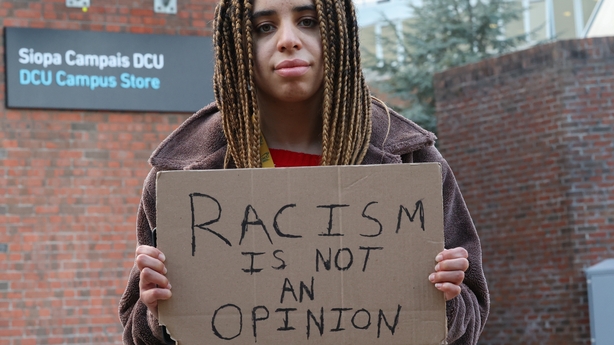New legislation to tackle hate crime and hate speech will be published by Minister for Justice Helen McEntee today.
The Incitement to Violence or Hatred and Hate Offences Bill is designed to make securing prosecutions for these crimes easier, and includes a demonstration test in addition to a motivation test outlined in an earlier draft of the legislation.
The bill adds gender, including gender expression and identity, and disability to a list of protected characteristics which include race, colour, nationality, religion and sexual orientation.
Ireland does not currently have specific legislation to deal with hate crime, but the Bill is expected to be enacted by the end of the year.
It will also create aggravated forms of certain existing criminal offences, such as assault and criminal damage, where those offences are motivated by hatred.
They will carry an enhanced penalty and someone's criminal record will clearly state that the offence was a hate crime.
The provisions of the new legislation have been crafted to ensure that they will capture hate speech in an online context, for example on social media, also.
Minister McEntee said that hate speech was abuse which sees vulnerable and minority communities targeted the most.
"We have worked hard to strike a balance in this Bill in protecting the right to free speech with protection of vulnerable and minority communities from dangerous hate speech.
"Although it is a small minority of individuals carrying out these reprehensible acts and spouting this abuse, there is a clear desire from the public that these individuals need to be dealt with in the appropriate way.
"All provisions throughout the Bill have been carefully developed to ensure it is victim-centred and effective in securing convictions where serious crimes are committed".
She added that hate speech has "no place" in society.

"Ultimately, hate speech is not about free speech. Hate speech is designed to shut people down, to shut them up, to make them afraid to say who they are and to exclude and isolate them."
The new offences will allow for the "hate criminal" label to follow an offender in court, in garda vetting etc, and the data gathered will give a fuller picture on the prevalence of different kinds of hate incidents in Ireland.
Associate Professor in Sociology at the University of Limerick Dr Amanda Haynes said that the minister’s announcement sees a change in the language used around hate speech and that was to be welcomed.
Speaking on RTÉ's Morning Ireland, she said there has been a long wait for legislation.
"We need a legislative framework for dealing with hate crimes. We're already dealing with them through the courts, but without a legislative framework we don't have clarity or consistency for victims, for offenders or for criminal justice professionals."
She added that hate crime depends on the construct under the law, and motivation has a high threshold of proof but with the new aspect of the demonstration test, it will allow for looking at what led up to the crime.
"Previously we heard language around proportionality and clarity, and now we have moved to language around ease of prosecutions.
"But ease of prosecutions isn't really a principle that we apply in determining generally how to formulate the law and it's going to create a very broad net. If our only measure of effectiveness is how many convictions we secured, then perhaps this is the appropriate way forward.
"But I think we also have to think about the principle of minimal criminalisation and the principle of fair labeling. Are those two groups of people really equivalent?
"Both of them undoubtedly cause harm with their expression of homophobic pressure. But it is the nature of the harm that they have caused really equivalent? Do we want to address both in the same way under the law, and do we want to have no capability to distinguish between those two groups of people?
"Those who demonstrated prejudice and those who were motivated to commit an offence out of prejudice."

